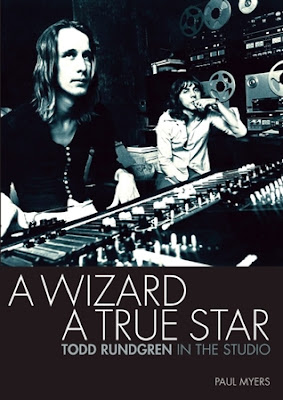A Wizard in the Studio
Book Review: A Wizard A True Star: Todd Rundgren in the Studio by Paul Myers
For a long time I resisted getting this book. I’m always wary of books about musicians:
they tend to fall into one of two camps, sycophantic fan hagiography or hatchet
job. Whilst I am a huge fan of much of Mr. R’s musical output (though equally
finding some his songs irritating, ultimately pointless or just plain boring)
neither approach appeals to me.
Persuaded by some positive reviews and the fact that the book
is billed not as a straight biography, but rather as a career history focussing
on Todd’s studio work, I decided to give it a go. Happily, I was not disappointed.
Todd Rundgren is not a household name in the UK (nor that
well known in America), and his albums are relatively unknown outside of music
fans and journalists, even though a very large number of households probably possess
at least one album he’s produced, played and sung on. On that basis alone it’s fair to say this
book will not have mass appeal, but the book still has something of interest
for anyone with a general interest in the music business (I hate that term),
what a music producer does, the trials and tribulations of record labels, being
In a band as well as for the dyed-in-the-wool fan.
The approach taken by the author, Paul Myers, is to present a
largely chronological view of both the development of Todd’s skills as a studio
engineer and producer and his work in the studio – be that recording his solo
albums, the various incarnations of the band Utopia or the albums of a diverse
set of clients for his ever increasing production skills. Whilst I’m fairly certain the author is a
fan, he doesn’t shy away from telling us which bands / band members didn’t get on
with him, and why they didn’t get on. You do go away from the book with a
“warts and all” sense of the man.
Apart from the solo / Utopia albums, there’s a lot about his
role in the making of albums by The Band, Sparks, Hall & Oates, The New
York Dolls (first), The Psychedelic Furs and XTC (‘Skylarking’) to name but a
few. It also necessary to mention ‘Bat Out of Hell’, which was his most
successful (in terms of money made, at least) production and which is discussed
in a lot of detail. For better or worse,
it seems that the album would never have seen the light of day were it not for
Todd’s efforts and much of the sound (Todd plays guitar, sings backing vocals
etc).
For the fan the book provides a fascinating and illuminating
read, both in terms of the sections on the making of the most loved albums, but
also especially the bits where his personal life and songs most obviously
overlap, for example the genesis and recording of “Nearly Human”. It also
explains why some of the mid-period solo albums are so disappointing (e.g. ‘The
Ever Popular Tortured Artist Effect’, ‘Healing’), at least to these ears. Overall I’d thoroughly recommend the book to anyone remotely interested in the man, his music or the bands he’s produced. After reading the book I went back to the albums with renewed interest and listening for things I’d not noticed before, even after 30 odd years of listening to some of the earliest albums.


Comments
Post a Comment